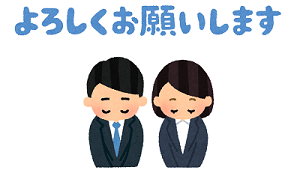Japanese Interview questions Sample 2
The first question you will always get is some version of “please introduce yourself,” most commonly:
Jikoshoukai wo onegai shimasu (自己紹介をお願いします/じこしょうかいをおねがいします)
The key vocabulary here is 自己紹介. Simply listen for this word, regardless of how the question is phrased. You’ll know you need to introduce yourself when you hear it.
This monologue should include information about your most recent activities, such as employment history or university courses, as well as information about yourself, such as pastimes, passions, and hobbies. Keep it short and sweet; don’t go into too much detail. The best way to properly introduce yourself is to prepare a short monologue. Take care of yourself.Keep in mind that this, like everything else you say in a Japanese interview, should at the very least be polite. knowledge of the business In most cases, an interview will last about 30 minutes. This monologue should cover your latest activities, whether work history or university courses and a little about yourself, such as pastimes, passions, and hobbies.
Keep it brief, don’t go into too much detail. Keep in mind that this, along with anything else you say during a Japanese interview, should at least be in the polite form.
Knowledge about the company
Typically an interview will Begin by describing your knowledge of the company. You might well be asked:
•What are your impressions of our firm?”
ni tsuite nani wo shitte imasu ka? (Company name) ni tsuite nani wo shitte imasu ka? (Company name について何を知っていますか/についてなにをしっていますか).
The firm’s name, and, are crucial terms to listen for, and then you should give a brief description of what you know about the company based on your study – for example, corporate history, products, customers, competitors, and so on.
Alternatively, you may also be asked:
• “What does our company make? What kind of products are there?”
Donna seihin ni tsukawareteiru ka gozonji desu ka? (Company name) ga dono youna seihin wo tsukutteiru ka, donna seihin ni tsukawareteiru ka gozonji desu ka? (Company name がどの様な製品を作っているか、どんな製品に使われているかご存知ですか/company name がどのようなせいひんをつくっているか、どんなせいひんにつかわれているか ごぞんじですか).
This question inquires as to what kind of items the company now produces and sells. The firm name, as well as the verb forms or, are important vocabulary items. You know you need to talk about the company’s products once you hear such phrases.
How do you think you’d be a good fit for the job?
Of course, you, the job, and the job criteria will occupy a significant portion of the interview. One of the first questions you may hear is:
• “Regarding the position that you have applied for, what do you know about it?”
Dou rikai shiteimasu ka, konkai omoushikomi no pojishon ni tsuite?
(今回お申し込みのポジションについて、どう理解していますか / こんかいおもうしこみのぽじしょんについて、どうりかいしていますか)
This indicates that they are inquiring about your application for this position as well as your understanding of the job role. The keywords to listen out for are お申し込み, ポジション and 理解. You should talk about the job role, as well as why you applied, and try to demonstrate how your experience complements the job function.
Why did you apply for this job?
Frequently, an interviewer will inquire as to why you applied for the employment. The question is usually written in a straightforward manner. They might ask you:
• “Please tell us why you applied,”
oubodouki wo oshiete kudasai (応募動機を教えて下さい/おうぼどうきをおしえてください).
Instead of 応募動機, the interviewer could also possibly ask:
shiboudouki, oubo shita riyuu, (志望動機、応募した理由 / しぼうどうき、おうぼしたりゆう),
ouboshita kikkake (応募したきっかけ / おうぼしたきっかけ)
or shibouriyuu (志望理由 / しぼうりゆう)
These all have a similar meaning. Again, I recommend emphasising the experiences and talents you have that are relevant to the employment role in your response.
Other questions to consider
One question you could hear – and which can cause confusion – is:
• “What motivates you to leave your current position?”
ima no shigoto wo kaetai riyuu ha nan desu ka (今の仕事を替えたい理由は何ですか/いまのしごとをかえたいりゆうはなんですか).
This suggests they’re asking about your reasons for shifting jobs, but it’s easy to misinterpret this question as the interviewer inquiring about your current work only by listening for the crucial words. It’s critical to answer correctly, and as with any interview, you must avoid criticising your prior career or the organisation you worked for while answering this type of question. You might also be asked the following questions.:
• “If you were placed in this position, please tell us about what you would like to achieve” or:
anata ga moshi kono oshigoto ni saiyou saretara, okonaitai koto wo oshiete kudasai (あなたがもしこのお仕事に採用されたら、行いたいことを教えて下さい/あなたがもし このおしごとにさいようされたら、おこないたいことをおしえてください).
The question simply asks what you want to accomplish if you were to get this job. To respond, you must first understand the nature of the task and be able to propose a realistic target that you would like to achieve.
Know what you’re all about
Finding out about you is one of the key goals of the interview. They may inquire about your current employment if you are currently employed.. One question you may expect to hear is:
• “Please tell us about your current job,”
genzai no shigoto naiyou wo oshiete kudasai (現在の仕事内容を教えて下さい/げんざいのしごとないようをおしえてください).
This is an opportunity for you to emphasise important abilities and the type of job you do. Because the crucial phrase in this sentence is (inside a job), make sure you explain about what you do in your current job rather of just talking about employment in general. Discuss the value you bring to your current employer. It is also a good opportunity to show how your experience matches the position you have applied for.
Your relevant background.
The interviewer, on the other hand, will want to learn more about any experience you cite and will ask for more specific instances. Let’s pretend the job was in sales. In this instance, they may inquire:
• “Please tell us about your experience in sales.”
ima made okonatta seerusu katsudou ni tsuite oshiete kudasai (今まで行ったセールス活動について教えて下さい/いままでおこなった せーるすかつどうについておしえてください).
This question is quite typical, and You can use the term “sales” to refer to a variety of skills, abilities, or experiences. It is critical to pay attention to the word because they are requesting certain behaviours. And if you want to improve your listening, be sure to check out this post.
In order to see what you are like, especially in regards to working under pressure, Both questions inquire about your reaction to pressure.The following questions will be asked of you by the interviewer:
• “What do you do when you’re under a lot of pressure? Please explain exactly how you would cope,” or:
puresshaa ni dou taiou shimasu ka, puresshaa ni taisho suru houhou wo oshiete kudasai. (プレッシャーにどう対応しますか。プレッシャーに対処する方法を教えて下さい/ぷれっしゃーにどうたいおうしますか。ぷれっしゃーにたいしょするほうほうをおしえてください).
Both questions inquire about your reaction to pressure. The term pressure itself is simple to grasp; all you need to be aware of are the verbs. 対応します and 対処する.
What makes you enthused about work in the morning?
The interviewer will also want to explore a little into your motivation, asking:
• “What kind of work is particularly motivating for you?”
Soushitsu sasemasu ka dono youna shigoto ga anata no yaruki? (どのような仕事があなたのやる気を喪失させますか/どのようなしごとがあなたのやるきをそうしつさせますか).
This question is also inferring what kind of work deters you, so avoid saying anything that isn’t relevant to the job function you’ve applied for!How do you handle troubleshooting at your workplace? Troubleshooting questions are possibly the most dreaded form of question, as they might be difficult to foresee.
How you manage troubleshooting at work.
Troubleshooting questions are perhaps the type of question that everyone dreads most, as they can be hard to anticipate. The interviewer may present you with a difficult circumstance for which you must come up with a solution. At a basic level you may get questions like these:
• “What do you do if you can’t make a deadline?”
Shimekiri ga mamorenasasouna toki ha dou shimasu ka. (締め切りが守れなさそうな時はどうしますか/しめきりがまもれなさそうなときはどうしますか).
• “What would you do if you couldn’t effectively manage your workload?”
Dono youni taisho shimasu ka, shigotojou taimu maneejimento ga umaku ikanai baai, shigotojou taimu maneejimento ga umaku ikanai baai. (仕事上タイムマネジメントが上手くいかない場合、どのように対処しますか/しごとじょう たいむまねーじめんとがうまくいかないばあい、どのようにたいしょしますか).
These two questions are very similar; the first asks if you can meet a deadline (), thus you must come up with a suitable alternative. Give your response to what you would do in this case. The second question is a little bit more focused on how you deal with (対処) time management problems.
It is always best to prepare several examples as responses prior to your interview. The following question also asks you to explore a hypothetical situation:
• “If you come across a problem during work, how would you resolve it?”
Shigotojou mondai ga hassei shitara, dou kaiketsu shimasu ka.”(仕事上問題が発生したら、どう解決しますか/しごとじょう もんだいがはっせいしたら、どうかいけつしますか).
This question inquires as to how you would deal with an issue that has arisen. Preparing specific examples that you can easily talk about and go into more detail about if prompted is a good idea.
• “At work, there’s someone with whom you don’t get along. What would you do if you didn’t know how to get along with them?”
Shokuba de umaku tsukiaenai hito ha donna hito desu ka shokuba de umaku tsukiaenai hito ha donna hito desu ka Mata, sono kata to dou yatte umaku tsukiaimasu ka. (職場で上手く付き合えない人はどんな人ですか。また、その方とどうやって上手くつきあいますか/しょくばで うまくつきあえないひとは どんなひとですか。また、そのかたとどうやって うまくつきあいますか).
This is dealing with more interpersonal issues, like what kind of person you don’t get along with and what you would do in that situation. I’d emphasise in your response that you don’t have a certain type of individual with whom you don’t get along, but if you did, you’d use your communication skills to solve the problem.
• “How would you handle a workplace conflict with a coworker with whom you disagree?” How would you come to an understanding?”
Shigotojou, iken no awanai douryou ni dou sesshi, taiou shimasu ka (仕事上、意見の合わない同僚にどう接し、対応しますか/しごとじょう いけんのあわないどうりょうに どうせっし、たいおうしますか).
This question is asking if you have a difference of opinion with a work colleague, 同僚, again I would highlight communication skills in your answer and try to make it clear that you get along with people quite well.
In your response, I would emphasise communication abilities and make it evident that you get along well with others.
• “Can you tell me how you cope with challenging people?””
Atsukai no muzukashii hito ni tai shite, dono youni taisho shimasu ka (扱いの難しい人に対してどのように対処しますか/あつかいのむずかしいひとにたいして どのようにたいしょしますか).
This is similar to the previous question but the interviewer is asking more directly what you would do if another person was difficult. You can think in terms of difficult customers rather than difficult colleagues.
Your applicable experiences and skills.
An essential part of the interview is about your strengths, but the interviewer may also ask about your weaknesses:
• “Can you tell us about your strengths/weaknesses?”
Anata no chousho/tansho wo oshiete kudasai (あなたの長所・短所を教えて下さい/あなたのちょうしょ・たんしょをおしえてください).
If you hear 長所, then you need to give examples of your strengths. If you are asked about your 短所 then you need to provide examples of your weaknesses. As a rule of thumb, you should prepare three examples of strengths prior to any interview. For anything you are not good at, you should also include an explanation of how you are overcoming it.
Alternatively, the interviewer may go straight into asking you about your experience. For example:
• “How do you think your experience matches the position?”
“anata no keiken kara donna koto wo heisha de ikaseru to omoimasu ka?“ (あなたの経験からどんなことを弊社で生かせると思いますか/あなたのけいけんから どんなことをへいしゃで いかせるとおもいますか).
Important vocabulary to listen out for would be 経験, 弊社に and 生かせる. It is vital that in your answer that you don’t just talk about your experience but actually answer the question.
For example, you can talk about specific job roles that you have had which make you a suitable match for the job you are interviewing for. 弊社 refers to the company where you have applied for a job, it is best to keep an ear out for this word.
A similar question, but in regards to skills, would be:
• “How do you think your skills match the position?”
“anata no sukiru no donna koto wo ikaseru to omoimasu ka” (あなたのスキルのどんなことを生かせると思いますか/あなたのすきるのどんなことをいかせるとおもいますか). 生かせる is an important word to remember as it can be used quite often.
Another way to find out more about you is to ask:
• “If you compare yourself to someone else, how would you do work differently?”
“hoka no hito to kurabete, anata ha dou chigatte oshigoto ga dekimasu ka” (他の人と比べて、あなたはどう違ってお仕事が出来ますか/ほかのひととくらべて、あなたはどうちがっておしごとができますか).
This is a difficult question to answer, however you can emphasise your unique talents.For many positions, the interviewer will want to know how you rate your communication abilities as a personal quality or strength, therefore they may ask:
• “If you think of a new idea, how would you convince your superior about it?”
“atarashii aidia ga detekita toki, dou joushi ni settoku shi, nattoku shite moraimasu ka.” (新しいアイディアが出てきた時、どう上司に説得し、納得してもらいますか/あたらしい あいでぃあがでてきたとき、どう じょうしにせっとくし、なっとくしてもらいますか).
The following are the most important aspects of this question: アイディアが出てきた時 and 上司に説得し、納得して, which indicate to you that it’s all about having a good concept and convincing others of it. It’s a good idea to think of a previous example to include in your response.
The following is an example of an interview question that might take many individuals off guard:
• “What are your qualifications?” How would they be beneficial to the company?”
“anata no benefitto ha nan desu ka. Youni kaisha ni kangen dekimasu ka” Sore wo dono youni kaisha ni kangen dekimasu ka”” (あなたのベネフィットは何ですか。それをどのように会社に還元出来ますか/あなたの べねふぃっと はなんですか。それをどのように かいしゃに かんげんできますか).
The issue is with the word benefit, which may lead you to believe this is a rhetorical question.They’re asking about job benefits, but they really want to know how you’d benefit the company.
Finally, as a foreigner, they may be curious about your Japanese abilities and may ask:
• “Please tell us about your Japanese level.”
“anata no nihongo no reberu wo oshiete kudasai“ (あなたの日本語のレベルを教えて下さい/あなたの にほんごのれべるをおしえてください).
You can answer this with information about your Japanese Your academics, any JLPT examinations you’ve taken, and any related experiences are all important factors to consider. Of course, the ideal method to ace the interview is to speak flawless Japanese the entire time!
Your accomplishments
The interviewers could also want to learn more about any accomplishments you highlighted in your application or during the interview. After that, you’ll be asked the following question:
• “Please tell us about anything you’ve accomplished. How did you achieve it?”
“Ima made no shigoto de tassei shita koto wo oshiete kudasai (Ima made no shigoto de tassei shita koto wo oshiete kudasai). Mata, sono purosesu wo oshiete kudasai” (今までの仕事で達成したことを教えて下さい。また、そのプロセスを教えて下さい/いままでのしごとで たっせいしたことをおしえてください。また、そのぷろせすをおしえてください).
This question refers to what you’ve accomplished so far, as well as the steps you took to get thereIt’s critical to have particular responses ready.. It’s very important to have prepared specific answers. You can, for example, discuss how you oversaw a team that met its sales goals – but you must also clarify what those goals were, how they were met, and the value of teamwork throughout the process.
The keyword to remember here is 達成 as you may also hear this word if the interviewer wants to ask about other kinds of achievements.
Be prepared to get personal.
Personal questions
The interviewer may finish with some questions that are a bit more general and personal, such as:
• “What are your thoughts about your career? What kind of work are you looking for?”
“kongo no kyaria wo dou kangaete imasu ka? Kongo dono youna pojishon de, dou itta shigoto ga shitaidesu ka” (今後のキャリアをどう考えていますか。今後どのようなポジションで、どういった仕事がしたいですか/こんごのきゃりあをどうかんがえていますか。こんご どのような ぽじしょんで、どういったしごとがしたいですか).
They’re asking you what you think about your career and what kind of job you’d like to have in this scenario. It’s preferable if you match your response to the requirements of the position you’ve applied for.
They could also like to know a little bit about your hobbies:
• “What is your favourite pastime?”
“shumi ha nan desu ka“ (趣味は何ですか/しゅみはなんですか).
You should be on the lookout for the word, and you can respond with anything pertinent about yourself and your interests..
posing questions to the interviewer
At the end of an interview, ask at least a couple of questions, such as why the position became empty, what kind of person would be effective in the work, and for additional information about the role. When asking any and all questions, you must ensure that you utilise polite terminology.
End the interview on a high note
When the interview is over, you must rise up again and sit next to your interviewer.ur chair and say a simple:
• “Thank you very much.”
“doumo arigatou gozaimashita” (どうもありがとうございました)
You then bow, walk to the door, turn around and say “失礼します /しつれいします” while bowing.After you’ve passed through the door, you should bow once more right before closing it.
Congratulations on making it in and out of the room without being seen, and on successfully completing a Japanese interview!Quick side note!
If you have Japanese language skills, and you Love Japan, nihongomax.com might have an amazing opportunity for you!
Check our jobs page on nihongomax.com to see what positions we’re currently hiring for!












